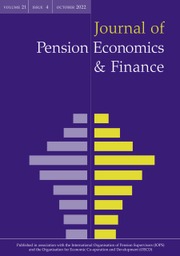Article contents
How do older workers use nontraditional jobs?
Published online by Cambridge University Press: 21 May 2020
Abstract
Working consistently through one's early 60s is key to retirement security. However, workers without access to retirement plans and health insurance will likely struggle to achieve such security. This paper uses the Health and Retirement Study to identify nontraditional jobs – which lack these benefits – and applies sequence analysis to explore how workers aged 50–62 use them. The results suggest that most nontraditional jobs are used by workers consistently, and that fewer workers use these jobs briefly or as a bridge to retirement. Workers consistently in nontraditional jobs end up with less retirement income and are more likely to be depressed.
Keywords
- Type
- Article
- Information
- Journal of Pension Economics & Finance , Volume 20 , Special Issue 3: Retirement Decisions in a Changing Labor Market , July 2021 , pp. 374 - 392
- Copyright
- Copyright © Cambridge University Press 2020
References
- 3
- Cited by


